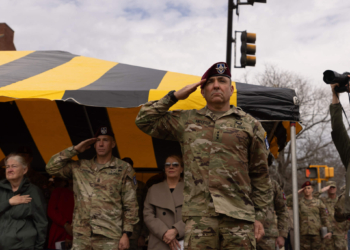One veteran has found a renewed sense of pride in wearing a U.S. uniform after ranking first on Team USA in his sport.
At the American Para-Cup National Championships in Lake Placid this spring, 14 athletes from Team USA participated in the bobsled and skeleton competitions. Will Castillo, an Army veteran, not only had the fastest time, but also earned the number one position on the team. He will drive the USA 1 bobsled for the upcoming Para Sport World Cup Season.
Castillo was wounded in Iraq in 2007, and his left leg was amputated. His path from injury to the Paralympic bobsled team took over a decade, but he now loves the sport and the competitions.
A career cut short
Castillo enlisted in the Army right after the September 11th attacks. As a New Yorker, he felt compelled to do something. As a result, he served in the Army for 10 years, reached the rank of staff sergeant and deployed to Iraq three times.
During his final deployment, he was hit by an IED and shot several times. In fact, two of his fellow soldiers were killed in the attack. Castillo survived, but lost his leg.
After the injury, he spent two years recovering at Walter Reed National Military Medical Center. His mother and sister were there from the moment he woke up, but even with their support, Castillo said he struggled.
“The recovery was learning how to walk with a prosthetic, balance myself; a lot of stuff I had to relearn,” he said. “I was 27 years old, still trying to figure out what to do with my life. I had a sort of identity crisis, losing my identity as a staff sergeant and going through PTSD. But I was also the older veteran there and tried to take on a leadership role to help others.”
Support from new friends

After leaving Walter Reed, Castillo moved to Florida and tried to find a place to live. The organization, Building Homes for Heroes, reached out and offered him a mortgage-free home that would be adapted to his injuries. Castillo said he was amazed.
Castillo soon built a friendship with Andy Pujol of the nonprofit. Castillo describes him as a father figure who “took me under his wing and let me know everything would be all right. Andy brought me with him to do public speaking and help younger veterans. When I started allowing myself to go out there, talk and meet people is when I started to blossom.”
Having peace of mind from the home allowed Castillo to focus on Paralympic sports. He met his coach, Kim Seevers, several years prior through an annual camp she runs for wounded veterans. He went to camp at the invitation of another wounded veteran, just looking to try something new.
Castillo described his initial experience in the skeleton, a sport where a single athlete races downhill on an ice track, laying face forward on a sled.
“My first time, I went down the ice in jeans because I had no experience. It was scary, and I got kind of banged up,” he said.
Seevers laughed and added, “Will kept coming back and trying, but he had the most epic bruises of anyone I’ve ever seen in my life!”
Nevertheless, Castillo kept returning. After attending six camps through a grant from the Department of Veteran Affairs, he pushed himself and became better. He attributes his success to Seevers’s encouragement.
“I could always have given up, but I stuck through it,” Castillo said. “Coach Kim has been like a really strict, hard mom with tough love. I needed Andy and Coach Kim in my life. I wouldn’t have been able to do it alone.”
Falling in love with the bobsled
Three years ago, Seevers introduced mono-bobsleds into her camps. The mono-bob is a single sled for a disabled person, so no one needs to push or jump in. Castillo loved it.
Castillo explained the thrill of the bobsled track.
“The adrenaline rush — it’s like a roller coaster feeling, except you’re in control. It’s scary and exciting at the same time. It pushes you, but you’re having fun. There’s no disability on the ice, it’s just you and that bobsled,” he said.
He said he quickly loved racing and trained hard to reach competition weight.
In 2017, Castillo went to Switzerland to compete in the International Bobsleigh Skeleton Federation Para Sport World Cup under a sponsorship from Building Homes for Heroes. He said that competing on the international scene was a huge accomplishment.
“I accomplished something on my own for the first time as a disabled veteran, outside of military service,” Castillo said. “That felt great, because up until then I had only ever accomplished something as a soldier.”
Seevers said Castillo stands out as an athlete because, “He brings military discipline and teamwork to what they do. Will once told me, ‘I just want to wear USA on my back again, and have a guy on my left and a guy on my right that will watch out for each other.’”
Overcoming obstacles
As an able-bodied coach who has spent her career training Paralympians, Seevers insists that Paralympians train just as hard as any Olympic athlete, despite the added obstacles to overcome.

“Driving a bobsled is driving a bobsled,” she said. “The premise of Paralympic sports is that your disability doesn’t allow you to do certain things, but you need to overcome the obstacles and do that thing anyway. Will worked so hard to move towards this goal. That’s what really impressed me, because he does it all so quietly. Seeing someone like Will come and try it out, then become USA 1, that’s what it’s all about.”
One obstacle Paralympians face is simply being allowed to train or compete. When Seevers first suggested using the Lake Placid track for wounded veterans, the track manager initially fought back because he considered it too dangerous for someone with disabilities to be on the ice. But after seeing the first camp, he had a complete turnaround and asked, “What can I do to make this a Paralympic training center?”
Castillo said he is grateful for all the athletes getting the opportunity to train and race at Lake Placid.
What’s next?
The recent victory at Lake Placid, the team’s home track, meant a lot to Castillo.
“We know that track,” he said. “I’ve been down it upside down and sideways. It was a lot of fun competing with some of my best friends. When the times were given and I won that spot, it was an incredible experience.”
Castillo said he is looking forward to training even harder this year to prepare for the American and World Cup competitions next winter, too.
“The whole team showed how professional we are and how much we’ve grown. They can’t ignore us anymore!” he said. “I’m honored to represent my country. It goes deep for me. I never I thought I would achieve that feeling again [since leaving the Army].”
Castillo encourages fellow veterans to find their own passions. After all, he knows the struggle of recovering an identity after injury.
“Find someone to talk to. Just try to go to as many events as you can. Don’t isolate yourself,” Castillo recommended. “I go to therapy twice a week because I need to. You could just stay in your home, but you have to challenge yourself and get outside your comfort zone.”
Seevers echoes the importance of sports for wounded veterans.
“The important thing isn’t that they are doing a sport. The important thing is that they are out and engaged and doing something. It’s all about the relationships and the connections, being part of something again,” she said.
Read comments






































